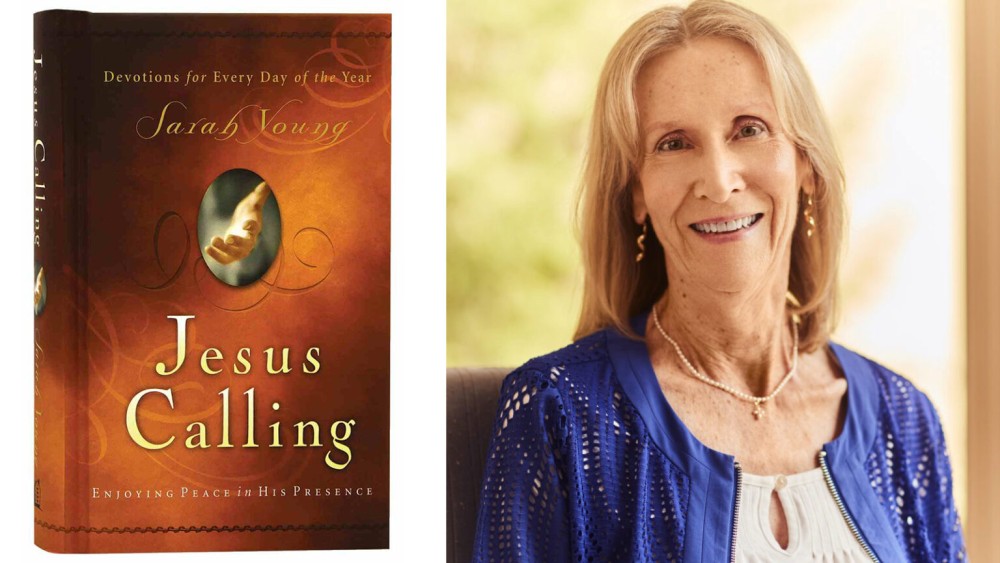Why a denomination is investigating late devotional writer Sarah Young

Jesus Calling: Enjoying Peace in His Presence and author Sarah Young. (Courtesy images)
Jesus Calling: Enjoying Peace in His Presence, a book of daily devotions that combines Bible verses with friendly messages written as if Jesus were speaking, has been one of the bestselling Christian books of the past 20 years. Written by a former Presbyterian Church in America missionary, Jesus Calling and its ancillary products have sold more than 45 million copies since 2004.
The book is currently fifth on the Evangelical Christian Publishers bestseller list.
Author Sarah Young, who died last year, never claimed the book recorded the actual words of Jesus, which she believed were found only in the Bible. Instead, she said, she was trying to convey what she felt during her prayer times.
Some of her fellow Presbyterians are unconvinced. They worry the book falsely claims to speak for Jesus and that for some readers, it has overshadowed the Bible, and that Young’s success challenges the authority of male church leaders.
During their recent general assembly, leaders of the PCA voted to ask a denominational committee to assess whether Jesus Calling is appropriate for Christians to read and to recommend further action if the book is not. They also voted to require Mission to the World, the PCA’s missionary organization—where Young’s husband, Stephen, is employed—to report on its relationship to the book.
The denomination’s action, which passed by a vote of 947-834, fell short of condemning the book or calling for an investigation into whether it was heretical. The original language, written by Benjamin Inman, a former PCA pastor from North Carolina, called for an investigation into whether the book violated the Second Commandment, which bans making graven images.
In the past, Inman has called Jesus Calling an “abysmal book” inspired by an “occult practice” known as automatic writing, in which a devotee channels a divine message. Any proceeds from the book that went to PCA causes were tainted, he said in an email.
Last December, Inman said he’d read a negative review of the book a few months after Young’s death and decided he needed to take action. He believes the PCA did a disservice by not spiritually correcting Young for her writing.
Young’s widower, Stephen, who is a PCA missionary living in Nashville, Tennessee, opposed the motion, saying his wife was a faithful church member who wanted to point people to the Bible.
Stephen Prothero, a religion scholar and author of God the Bestseller: How One Editor Transformed American Religion a Book at a Time, a history of popular books about religion, said Jesus Calling reflects a very common form of evangelical piety. When he studied evangelical Christians, he said, they would often claim to get private revelation from God all the time when trying to make life decisions, such as whether or not to take a job.
“If you pray and ask God for something, that requires no revelation,” he said. “But if you pray and ask God to clarify something for you—that does require revelation. And it’s not that unusual.”
Where Young might have crossed the line, he said, is in writing down what she heard from God and selling it. That has always made church leaders nervous, he said—especially when women are involved. Prothero said that claiming to hear from God can be seen as a challenge to the authority of the Bible and the authority of church leaders—which he suspects is what makes some Presbyterians wary of her writing.
Kevin Twit, who leads a PCA campus ministry in Nashville, agrees. Twit voted against the motion, saying it was unnecessary. But he said that in the PCA, claiming God spoke to you is discouraged.
“It’s a big deal to say, ‘Thus saith the Lord,’” he said. “It’s one thing to say, ‘I feel like God might be leading me.’ It’s another thing to say, ‘God told me to do something.’”
A spokesperson for Mission to the World said this is the first case in which the agency has been asked to report on its relationship with a missionary. Instead, any questions were handled by the church that sent out the missionary or a local presbytery.
The spokesperson declined to comment on whether the agency received donations from the proceeds of Jesus Calling, citing donor privacy. The agency also has no control over the books missionaries write.
Jeff Crosby, president of the Evangelical Christian Publishers Association, which gave Young a posthumous award honoring Jesus Calling and its impact in the world, said the group stands behind that decision.
“We believe both the author and the publisher made clear from the initial publication date what Jesus Calling was and was not purporting to be,” he said.
In an email, Stephen Young and the couple’s daughter, Stephanie van der Westhuizen, said proceeds from the book had been used to fund new churches and overseas missions, as well as other Christian charitable work. “Sarah always wanted to use the proceeds to benefit God’s Kingdom rather than accumulate earthly wealth herself,” they wrote.
Sarah Young, who was publicity-shy, would likely have been praying for her critics, if she were still alive, her family said. And she would have trusted that God works out things for the best.
“She likely would have not given this controversy much attention, as she knew that her conscience before God was clear, and that God would continue to use her book to bring people to Christ no matter what her critics said.” —Religion News Service



